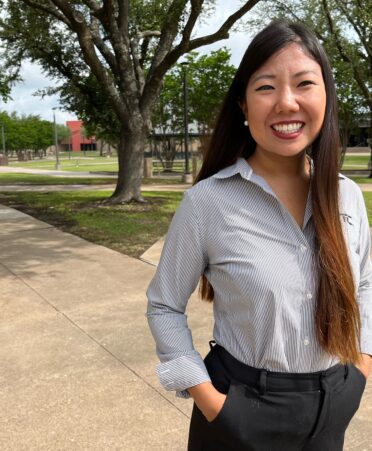(WACO, Texas) – Lucinda Yang, Ph.D., is the assistant director of enrollment at Texas State Technical College in Waco. She joined the college in August 2020.
Yang was born in Puerto Rico to parents who are missionaries, and she was raised in Tennessee. She has a Bachelor of Science degree in Theology and Theological Studies from Lee University in Tennessee, a Master of Divinity in Theology and Theological Studies from Duke University, and a Doctor of Philosophy in Systematic Theology from Baylor University. She also has a summer language certificate in Biblical Hebrew from the Harvard Divinity School.
What does your job entail?
My main job is to oversee the enrollment of TSTC in Waco’s students. I oversee the enrollment coaches, who are like an admission counselor plus an academic advisor. They take care of the students from the moment they become an applicant to the moment they walk across the stage (at commencement). We are all there for them. Retention is a big part of what we do in enrollment.
We have a slogan in the enrollment department: “Texas-Sized Care.” That is what we want to offer our students. When students come to TSTC, I hope they feel a deep sense of pride.
How did you become interested in the college enrollment process?
While I was at Baylor University working on my doctorate, my graduate fellowship was in the administration sector, so I worked for the graduate school and did a lot of what I do here (at TSTC) in enrollment. I said to myself that I did not want to be a research professor, and having to constantly publish and being locked in libraries did not appeal to me. The experience at Baylor opened up my eyes to other possibilities with academic jobs. Then the pandemic happened, and I wanted to stay (in Waco) and not make a big move.
The people at TSTC made me feel so welcome, and that is what I want to give the students.
Why should more women pursue technical education?
We need women. I think women bring a different perspective to systems. I think there are subtle differentiations in the male and female brain. I see sometimes that women can think more futuristically. They bring different perspectives and values that are needed for any technical field.
What is some of your family’s history?
My parents were Communist Party leaders in China. My dad had a profound religious experience, and he decided to become a Christian, but at the time in the university he was going to, it was forbidden and you would probably go to prison. He met a group of American English teachers who were missionaries, and they discipled him and offered him a scholarship to study at the Pentecostal School of Theology in Tennessee. My dad was very nervous because you have to get permission for absolutely everything in China. He had to go to the dean of the university and ask for permission to study at that theology school. It was a big risk, an act of faith on behalf of my dad. Instead of reading “school of theology,” the dean read “school of technology.” They gave my dad $2,700 and a plane ticket to America and told him to have a good time.
My parents were village sweethearts. He was the first in his village to go to college. They got married, and eight days later he went to America for three years. That is kind of common in a lot of immigrant families; one will go and establish themselves, get a good job, and get enough money to bring the other one. They still travel and do missionary work.
I am proud of my Chinese heritage. I am so thankful for the sacrifice of my parents. From my Chinese heritage, it has taught me about sacrifice, discipline, family and accountability. I really love that.
May is Asian Pacific American Heritage Month.
Registration continues for the fall semester. For more information, go to tstc.edu.
